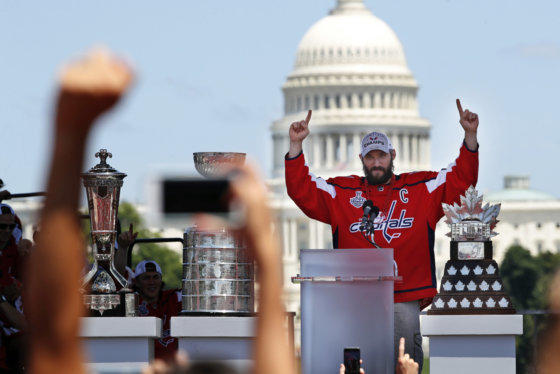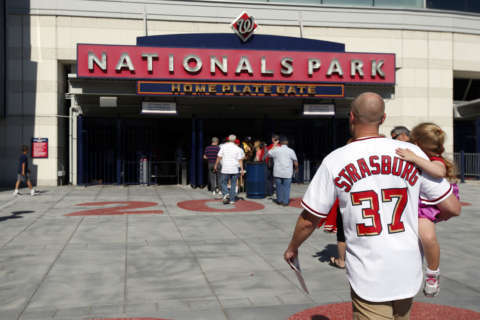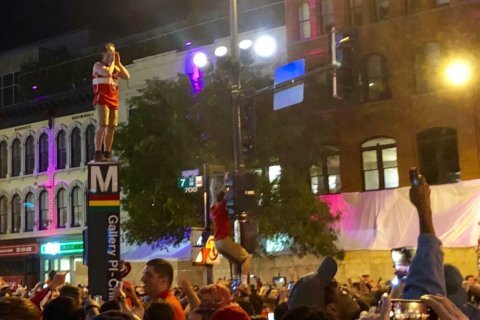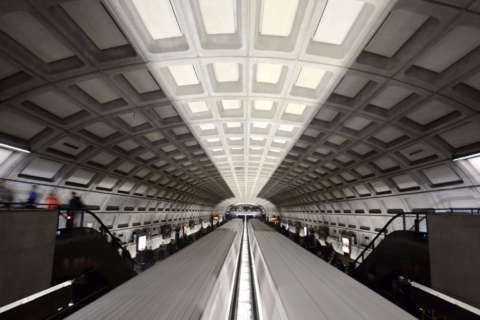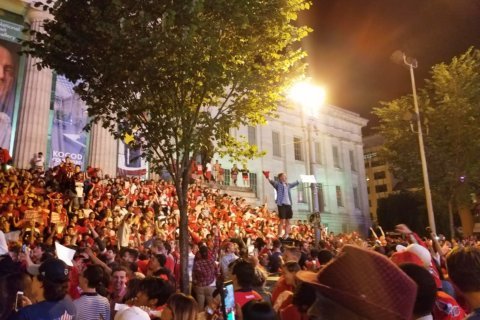WASHINGTON — When the Washington Capitals won the Stanley Cup this spring, there was almost as much drama about whether Metro would stay open as there was on the ice. But data obtained by WTOP through freedom of information requests show relatively few people ended up using the extra Metro service, except on the night the Capitals actually won the title.
On the four days that the Capitals had home games in the playoffs where service was extended, 964, 1,038, 1,091, and 3,531 people entered the Metrorail system after the normal 11:30 p.m. weeknight closing time.
But on June 7, when the Capitals won the title on the road with many fans crowded into and around Capital One Arena to watch on big screens, 23,452 people entered and 33,910 people exited the system after 11:30 p.m. Previously, Metro had only said that 35,644 people entered the system after 11 p.m.
Many of the home games ended up finishing before 11:30 p.m., making the extra service on those days most important as a way to reassure fans that if they took the Metro to the game they would be able to get home, allowing for a boost to ridership earlier in the night.
Even on days with few entries to the system after 11:30 p.m., thousands more people did not exit the system until after 11:30 p.m. A low of 5,492 people exited the system after 11:30 p.m. May 21, and a high for the home games with extended service of 12,061 people exited after 11:30 p.m. June 4.
On the four home dates, Metrorail recorded 627,521 to 675,691 trips for the entire service day.
On June 7, Metro recorded 766,362 trips, more than any other day to that point in 2018. The Capitals victory parade June 12 surpassed that though, with about 843,000 trips.
Who paid, and how much?
Service agreements and invoices show the four groups that paid Metro to keep the system open for an additional hour paid or owe more than $90,000 each.
Metro’s current policies call for a $100,000 deposit per hour and a minimum of two-weeks’ notice of extra service, but on short notice, like the playoff games, Metro has decided the payments can be handled after the fact.
Metro refunds the sponsors for any fares paid by riders entering the rail system after the regular closing time.
Exelon, Pepco’s parent company, paid Metro $97,746.85 on June 27 for the additional service on May 15.
The DowntownDC BID, on behalf of the Qatari government, paid Metro $97,885.20 on June 5 for the additional service on May 17.
Uber paid Metro $98,116.05 on June 13 for the additional service on May 21.
As of last week, Comcast had not yet paid the $91,586.85 it owes Metro for the additional service on June 4. Comcast was sent the invoice on June 19.
For the fifth extended hour of service as the Capitals won the Stanley Cup in Las Vegas June 7, Metro did not deal in cash.
The special service agreement with Monumental Sports, essentially the Capitals themselves, obtained by WTOP specifically describes the “in-kind” payment valued at $100,000.
The deal included one full business-day use of Capital One Arena for a Metro employee meeting this fall (that ended up being held last month) with lunch there for up to 2,000 attendees on a day the arena was not scheduled to be used for another event. It also required the company to recognize Metro as the only transportation sponsor for the June 7 Stanley Cup viewing party, including putting Metro messages and logos on Capital One Arena’s outdoor viewing boards and on digital and in-game signs at both Mystics and Capitals games.
Had Monumental paid in cash, it likely would have seen a rebate of about $50,000 based on the number of people who entered the system after 11:30 p.m. following celebrations downtown, but Metro also decided on its own to stay open an extra half-hour to 1 a.m., at an approximate cost of that $50,000.
The agreements for each of the extended hours either outlined Metro service at all Metro stations (Exelon) or service with late entry allowed only at stations near Capital One Arena but exit allowed at all stations. The $100,000 deposit or its equivalent remained the same for each of the deals.

